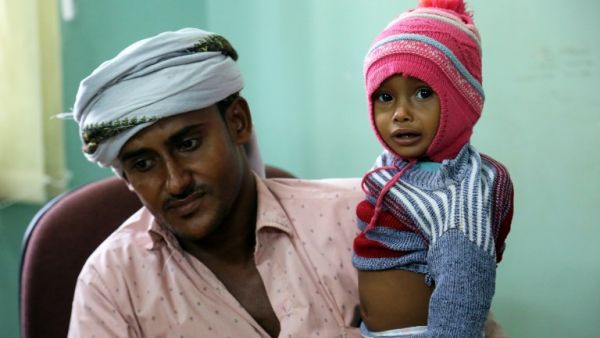Millions of Yemenis could die of starvation in the largest famine in decades if Saudi Arabia and its allies do not lift their blockade, the U.N. warned on Nov. 8.
The stark warning, a response to the tightened restrictions on Yemen following the targeting of Riyadh by a Houthi missile on Nov. 4. has seen a sudden outburst of concern in the international media, and on social networks.
This is happening right now in #Yemen - the ABC's producer in #Sanaa just filmed this on the weekend. UN says if #Saudi doesn't lift the blockade it "could lead to worst famine in decades & millions could die" #wecantsaywedidntknow pic.twitter.com/jCQRv7TLtf
— Sophie McNeill (@Sophiemcneill) November 13, 2017
The situation may be critical, but it is nothing new for Yemen, where conflict began in March 2015.
As early as April that year, a cholera epidemic began which has so far reached over 700,000 cases, according to the World Health Organization. In January this year, the U.N. estimated that at least 10,000 people had died in the conflict.
So, why has Yemeni suffering apparently received international attention overnight?
Simply, it is politically relevant: the events of the last fortnight have seen Saudi-Iranian tensions pushed to the brink.
Riyadh accused Tehran of providing the Houthi missile fired at Riyadh, calling it an act of war.
Shortly before that, Lebanon’s Prime Minister Saad Hariri resigned from the Saudi capital, in what many have suggested was a Saudi-orchestrated move. In his statement, Hariri slammed interference by Iran and Hezbollah in Lebanese affairs.
Suggestions have even circulated that Saudi Arabia might back a future Israeli war against Hezbollah.
The fact that Riyadh appears now to have decided to shift the site of its anti-Iran posturing to Lebanon is not coincidental. They have been humiliated by failure to reach military victory against Tehran-backed Houthis in Yemen.
In fact, the starvation of Yemeni citizens, some suggest, is a deliberate tactic by the Saudis to force collapse in Yemen.
So let's stop campaigning as if this looming famine in Yemen is a collateral consequence of Saudi actions: To starve Yemeni civilians is an overt act by Riyadh, enraged by a humiliating failure to achieve a Saudi military victory.
— هيكل بافنع (@BaFana3) November 13, 2017
Meanwhile, Saudi Defense Minister and Crown Prince Mohammed bin Salman has been busy promoting his program Saudi economic and social reform to the West.
These attempts to deflect attention from Saudi disgrace in Yemen appear, however, to have had the opposite effect, with increasing media focus on the situation there.
- Why the Fight for Yemeni, Palestinian Lives is Coming to London This Week
- Houthis Offer Saudi Princes Asylum in War-Torn Yemen, But Few Are Buying it
An easy question to answer is why Yemeni suffering has largely been ignored, at least politically, until now.
The Saudi-led coalition is backed and equipped by the U.S. and the U.K.
One of the worst atrocities of the last two years - if not the worst - is what's being done to Yemen. But because the primary culprits are the US, UK and their Saudi partners, it gets virtually no attention. https://t.co/jLWMpTEqHA
— Glenn Greenwald (@ggreenwald) November 12, 2017
Since 2015, Britain has agreed arms deals worth $4.9 billion to Saudi Arabia. In May this year the U.S. agreed weapons sales to Saudi Arabia worth $350 billion over 10 years.
Despite rights groups identifying British and U.S.-made bombs as having been used against civilian targets in Yemen, their respective governments seem blinded by the profits.
Only last month, then British Defense Secretary Michael Fallon urged fellow MPs to stop their “unhelpful” criticism of Saudi Arabia in the interests of securing a fighter jet deal.
Famine in Yemen. The country that Michael Fallon told us we shouldn't criticise in case it endangered our arms sales is responsible.
— Michael Rosen (@MichaelRosenYes) November 13, 2017
However, criticism of Saudi Arabia is exactly what the Yemenis need.
Following international condemnation of the intensified blockade, Saudi Arabia said on Monday that it would begin reopening Yemen’s sea and air ports.
The US-Saudi coalition now claims it will reopen airports and seaports in Yemen, after facing massive global outrage for pushing millions of Yemenis toward what the UN warned would be "the largest famine the world has seen for many decades"https://t.co/EsGtljr560
— Ben Norton (@BenjaminNorton) November 13, 2017
Yet, more remains to be done. Despite the U.N. humanitarian chief’s harsh warning "that unless those measures are lifted... there will be a famine in Yemen," the Security Council has not announced action on the blockade.
Kristine Beckerle of Human Rights Watch has said "It's not enough for the U.S. or the U.K. to say we are worried about famine in Yemen.
"At this point, it's up to the Security Council members, and particularly those allied with Saudi Arabia, to be using all the leverage at their disposal to be pushing these people to actually make changes to the ways in which they are fighting this war and certainly for them to stop impeding access to aid."
Perhaps if the barrage of media and popular concern in the West continues, the U.N., U.S. and U.K. might finally be shamed into action.






